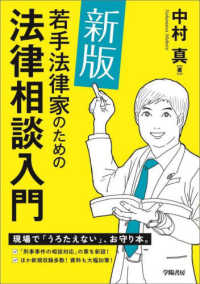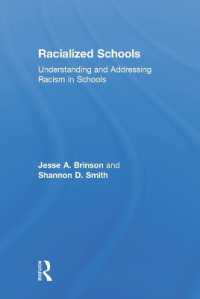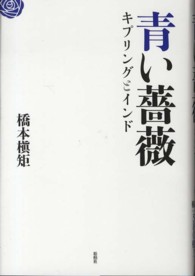- ホーム
- > 洋書
- > 英文書
- > Literary Criticism
Full Description
The Oxford Handbook of Oscar Wilde puts Wilde the Icon into an expansive literary and dramatic context. It offers a readable guide to Wilde studies for the early twenty-first century. Its chapters reflect Wilde's status as a queer writer while filling in the gaps that this focus have left and looking forward to the next generation of critical studies on Wilde. It is designed to appeal to students and those with a general interest in Wilde, as well as professional academics. Its comprehensive discussions of his writings show how these interact with, and transfigure, both their age and his life, while providing readers with clear and extensive suggestions on approaches to reading, thinking, and writing about them.
It is organized in four sections: Places, Works, Intellectual Contexts, and Reception. The first section on Places tells the story of Wilde's life and intellectual evolution through the places that defined its contours: Dublin, Oxford, London, America, France, and Italy. The second section on Wilde's Works provides new and in-depth directions to close reading Wilde's writing, with generative ideas on the development, style, structure, and significance of each of his major works. The section on Intellectual Contexts brings together chapters on the main ideas and cultures of thought that shaped Wilde's thinking, from late-nineteenth century sexuality and fashion to the ancient world and Charles Darwin's theory of evolution. The final section on Reception focuses on the central categories in which Wilde's works and life have been read and influenced cultural movements since his death. Wilde's afterlife has been vibrant and chapters in this section include discussions of how he influenced camp and pop, alongside the contentious textual history of his works.
Contents
Kate Hext and Alex Murray: Introduction: Wilde Variety
The Life
1: Jarlath Killeen: Ireland
2: Alex Murray: Oxford
3: Kate Hext: America
4: Nick Freeman: London
5: Joseph Bristow: The Trials
6: Peter Stoneley: Prison
7: Elisa Bizzotto: Exile in France and Italy
The Works
8: Kostas Boyiopoulos: Early Poems
9: Deaglán Ó Donghaile: Vera and 'The Soul of Man Under Socialism'
10: Mark Turner: The Journalism
11: Dustin Friedman: The Portrait of Mr W.H. and the short fiction
12: Caroline Sumpter: Fairy Tales
13: Josephine M. Guy: Intentions
14: Giles Whiteley: The Picture of Dorian Gray
15: Matthew Potolsky: The Picture of Dorian Gray in Context--Aestheticism, Imperialism, and Capitalism
16: Petra Dierkes: Salome
17: Sos Eltis: Lady Windermere's Fan
18: Anne Varty: A Woman of No Importance
19: Greg Mackie: An Ideal Husband
20: Francesca Coppa: The Importance of Being Earnest
21: Matthew Bradley: De Profundis
22: John Stokes: The Ballad of Reading Gaol
Intellectual Contexts
23: Shushma Malik: Classical Rome
24: Alastair Blanshard: Classical Greece
25: Richard Hibbitt: Wilde and France
26: Margaret D. Stetz: Wilde and Women
27: Lindsay Wilhelm: Evolution
28: Simon Joyce: Wilde and Sexuality
29: Dominic Janes: Wilde and Fashion
30: Dennis Denisoff: Wilde and the Natural World
31: Wilde and the Visual Arts
Reception
32: Rebecca N. Mitchell: Textual History
33: Di Cotofan Wu: Wilde in East Asia
34: Robert Stilling: Wilde in Africa and the Caribbean
35: Kristin Mahoney: Wilde and Camp
36: Neil Sammells: Wilde and Pop Culture








